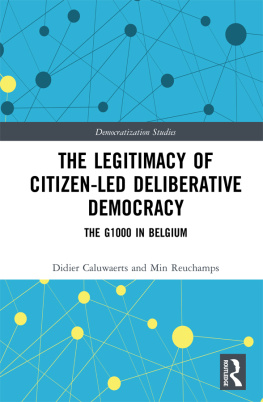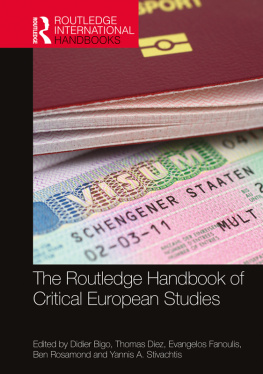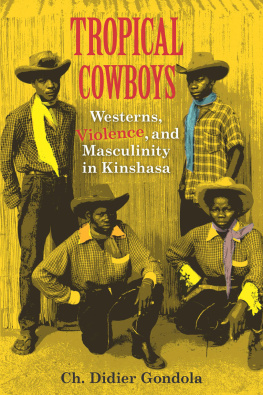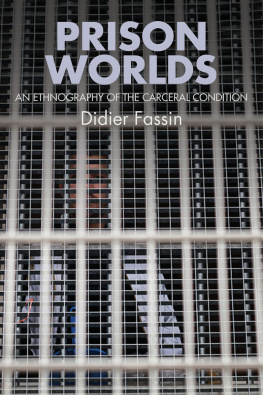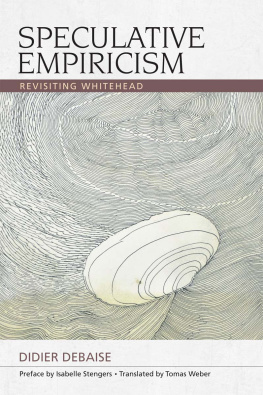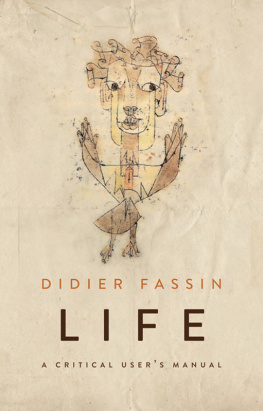Didier Fassin - Writing the World of Policing
Here you can read online Didier Fassin - Writing the World of Policing full text of the book (entire story) in english for free. Download pdf and epub, get meaning, cover and reviews about this ebook. year: 2017, publisher: University of Chicago Press, genre: Politics. Description of the work, (preface) as well as reviews are available. Best literature library LitArk.com created for fans of good reading and offers a wide selection of genres:
Romance novel
Science fiction
Adventure
Detective
Science
History
Home and family
Prose
Art
Politics
Computer
Non-fiction
Religion
Business
Children
Humor
Choose a favorite category and find really read worthwhile books. Enjoy immersion in the world of imagination, feel the emotions of the characters or learn something new for yourself, make an fascinating discovery.

- Book:Writing the World of Policing
- Author:
- Publisher:University of Chicago Press
- Genre:
- Year:2017
- Rating:5 / 5
- Favourites:Add to favourites
- Your mark:
- 100
- 1
- 2
- 3
- 4
- 5
Writing the World of Policing: summary, description and annotation
We offer to read an annotation, description, summary or preface (depends on what the author of the book "Writing the World of Policing" wrote himself). If you haven't found the necessary information about the book — write in the comments, we will try to find it.
Writing the World of Policing — read online for free the complete book (whole text) full work
Below is the text of the book, divided by pages. System saving the place of the last page read, allows you to conveniently read the book "Writing the World of Policing" online for free, without having to search again every time where you left off. Put a bookmark, and you can go to the page where you finished reading at any time.
Font size:
Interval:
Bookmark:
Edited by Didier Fassin
The University of Chicago Press
CHICAGO & LONDON
The University of Chicago Press, Chicago 60637
The University of Chicago Press, Ltd., London
2017 by The University of Chicago
All rights reserved. No part of this book may be used or reproduced in any manner whatsoever without written permission, except in the case of brief quotations in critical articles and reviews. For more information, contact the University of Chicago Press, 1427 E. 60th St., Chicago, IL 60637.
Published 2017
Printed in the United States of America
26 25 24 23 22 21 20 19 18 17 1 2 3 4 5
ISBN-13: 978-0-226-49750-1 (cloth)
ISBN-13: 978-0-226-49764-8 (paper)
ISBN-13: 978-0-226-49778-5 (e-book)
DOI: 10.7208/chicago/9780226497785.001.0001
Library of Congress Cataloging-in-Publication Data
Names: Fassin, Didier, editor.
Title: Writing the world of policing : the difference ethnography makes / edited by Didier Fassin.
Description: Chicago : The University of Chicago Press, 2017. | Includes index.
Identifiers: LCCN 2017005978 | ISBN 9780226497501 (cloth : alk. paper) | ISBN 9780226497648 (pbk. : alk. paper) | ISBN 9780226497785 (e-book)
Subjects: LCSH: Police. | Law enforcementFieldwork. | Law enforcementResearchMethodology. | Social sciencesResearchMethodology. | Law and the social sciences.
Classification: LCC HV7897.W75 2017 | DDC 363.2dc23 LC record available at https://lccn.loc.gov/2017005978
 This paper meets the requirements of ANSI/NISO Z39.481992 (Permanence of Paper).
This paper meets the requirements of ANSI/NISO Z39.481992 (Permanence of Paper).
Didier Fassin
Steve Herbert
Julia Hornberger
Beatrice Jauregui
Jeffrey T. Martin
Helene Maria Kyed
Elif Babl
Clara Han
Daniel M. Goldstein
Duncan McCargo
Susana Duro
Laurence Ralph
Didier Fassin
Didier Fassin
Law and order arise out of the very processes which they govern.
Bronislaw Malinowski, Crime and Custom in Savage Society (1926)
The police have for a long time been an object of interestand passionswithin society. For more than half a century, they have also been a subject of researchand debateswithin the social sciences, significantly contributing to the renewal of criminology. In recent years, however, this dual trend has become more pronounced, and policing has come to occupy an increasing place in the public sphere as well as in the scientific field: new issues have called for new approaches.
On the one hand, there has been a growing concern regarding law enforcement practices, particularly in poor neighborhoods and toward racial and ethnic minorities. The implication of the police in the death of young men of color in Aulnay-sous-Bois in 2005, Tottenham in 2011, and Ferguson in 2014, among many others, and the impunity from which they have benefitted, have caused major urban unrest in France, the United Kingdom, and the United States, respectively, revealing the moral gap between the law enforcement institution and the population that it is supposed to protect. Whether criticized or praised, respected or feared, the police have become a major controversial figure in the contemporary world, while law and order policies have tended to disseminate globally.
On the other hand, there has recently been a renewal in research on policing, both within the field of criminology, via the contestation of the dominant classical and positivist paradigms by critical, cultural, and feminist approaches, and within the humanities and the social sciences, through novel theoretical as well as empirical inquiry. An interesting trend of this renewal has been what could be called the reinvention of police ethnography. Indeed, there exists an important tradition of qualitative and observational approach in research on law enforcement. The most important implication of the ethnographic shift is that, far from being a mere empirical addition to existing methodological procedures, it obliges social scientists to reevaluate both the theoretical self-evidence of their object (policing) and their very relation to their subjects (the police).
The present volume is a collective attempt to link these two major trends: the increasing significance of policing issues in contemporary society and the growing salience of police ethnography for their comprehension.
So, what difference does police ethnography make? This interrogation can be understood from three complementary perspectives: What difference does it make for the study of the police? What difference does it make for the practice of ethnography? Finally, what difference does it make for the societies where it is conducted? In our chapters, we propose various answers to these questions, highlighting the relevance of ethnographic insight for the analysis of law enforcement and the contribution of the inquiry into policing to ethnographic practice as well as the pertinence of this approach for contemporary societies. But before going further, two prefatory comments may be necessary.
First, what is ethnography is generally taken for granted, namely as an equivalent, more or less, to fieldwork, participant observation, or qualitative approach. It is, however, much richer and more complex a practice than these self-evident equivalences imply. we do not only get to know our interlocutors better but we also realize that we have much more in common with them than what we had initially imagined. Finally, it is an operation of singular writing, that is, of transcription and translation, of putting into words and ideas what has been seen and heard, of giving a meaningful order to a succession of facts and events that may seem completely disparate at first sight: it all starts with a blank sheet or a black screen. These three aspectsmethod, experience, writingradically contrast with approaches relying on statistics, questionnaires, or interviews: ethnographers do not look at figures, but are interested in what is going on; they do not delegate their production of data to assistants, but are themselves present in the field; they do not ask standardized questions, but observe scenes and converse with their protagonists; they do not know in advance what they look for, but try to make sense of what people do, and how, and why; their mode of thinking is not deductive but inductive. All these elements differentiate ethnography from other procedures commonly used in studies on policing, particularly in the field of criminology, and pose specific epistemological, political, and ethical problems.
Second, policing also needs to be delimited, if not defined. It can refer to two quite different kinds of activities. In the usual sense, it corresponds to law enforcement and peacekeeping, in other words, what police officers and agencies do: it encompasses a remarkable diversity of practices, from arresting criminals to containing demonstrations, from ticketing drivers to assisting accident victims, with the sole common ground that they may at some point require the recourse to force, as pointed out by Egon Bittner. marginalized minorities. Our choice can easily be justified on the grounds that it represents the most common and often the most problematic activity of law enforcement in peace times all over the world. It is also where the control of the public order and the reproduction of the social order get the most confused, where the distance from professional norms is the most obvious, and where the indulgence of the authorities with respect to the deviance of their personnel is the highest. In sum, our decision to focus on this type of policing was not only guided by theoretical issues of possible comparisons and generalizations of our findings in various settings, but also by practical considerations with regard to its social relevance and political implications.
Font size:
Interval:
Bookmark:
Similar books «Writing the World of Policing»
Look at similar books to Writing the World of Policing. We have selected literature similar in name and meaning in the hope of providing readers with more options to find new, interesting, not yet read works.
Discussion, reviews of the book Writing the World of Policing and just readers' own opinions. Leave your comments, write what you think about the work, its meaning or the main characters. Specify what exactly you liked and what you didn't like, and why you think so.

